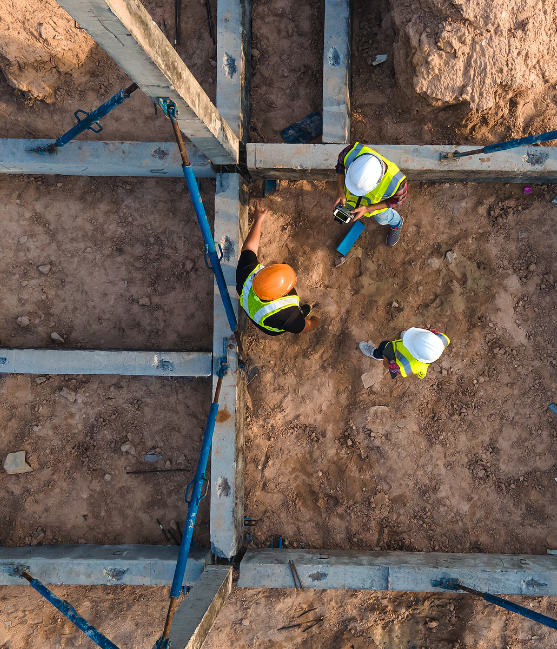Contractor Surety Bonds
Contractor surety bonds are an important part of the construction process, as they guarantee the owner of the project that the contractor will perform the work and pay their subcontractors and suppliers. Contractors are required to provide these bonds on public contracts and sometimes on private contracts.
The Surety Company issuing the bonds is financially responsible to complete the project and to pay subcontractors and suppliers due to a contractors default under a contract. Contractor surety bonds are typically used to protect an owner against losses resulting from the failure of a construction firm to complete a project or to pay their subcontractors and suppliers.
What is a Construction Surety Bond?
A construction surety bond is a type of guarantee used in the construction industry that guarantees the fulfillment of contractual obligations between a contractor and the Owner or General Contractor, known as the ‘Obligee’. This type of bond provides the Obligee with peace of mind that the contractor will meet all of the requirements of the contract within the designated time frame specified in the contract. Should the contractor default on the agreement, the Obligee may file a claim with the Surety Company who issued the bond to correct any defaults and/or to complete the project.
What Projects Require a Surety Bond?
Most construction projects will require some form of surety bond in order to protect the interests of all parties involved. Common examples of projects that may require a construction surety bond include:
- Government contracts: Most all government contracts require contractors to provide a construction surety bond in order to ensure that the project is completed as specified. Government contracts are either Town, City, State, or Federal Government.
- Private construction projects: While not as common as government contracts, some private construction projects may also require the use of surety bonds. This is typically done in cases where the project is large and complex, and the Owner of the project wants to ensure that the contractor has the ability to complete the project. Also the bank providing the financing to the owner of the project may require that the contractor provide a bond. This will ensure that the project gets completed which will enable the owner to generate revenues which will, in turn, pay the loan back.

How Do Contractor Surety Bonds Work?
A contractor surety bond is a contract between three parties:
- the Surety Company
- the Principal: Contractors
- the Obligee: Public and Private Owners
The Surety Company
Most Surety Companies are generally a division within a large insurance company. Prior to approving a contractor for a bond, the contractor must submit to an extensive underwriting process which includes a thorough examination of their financial records and performance history. The Surety Company issuing the bond provides a guarantee to the owner of the project that the contractor will perform the work under the Contract and pay their subcontractors and suppliers.
The Principal
The Principal is the contractor hired to perform the contract for the Obligee. The Obligee reviews bids submitted by each contractor then awards the contract to the lowest responsible bidder. The Principal is then required by the Obligee to sign a contract and provide the required bond.
By the Principal providing a bond, the Obligee gains several important assurances including:
- The contractor they have hired has been thoroughly underwritten by the surety company to be fully capable of completing the project per the contact plans and specifications.
- A lien free project due to the bond guaranteeing that subcontractors and suppliers will be paid.
The Obligee
The Obligee is the owner of the project being performed. The Obligee can be a Public or Private Owner or even a General Contractor requiring their subcontractors to be bonded back to them. Most often, the Obligee is a City, State, or Federal Government.
Obligees require a bond from a contractor working on their project as a guarantee that they will fulfill all contractual obligations. This helps to mitigate any risk to the Owner of financial loss as a result of contract failures.

How Do Contractor Surety Bonds Work?
- the Surety Company
- the Principal: Contractors
- the Obligee: Public and Private Owners
The Surety CompanyMost Surety Companies are generally a division within a large insurance company. Prior to approving a contractor for a bond, the contractor must submit to an extensive underwriting process which includes a thorough examination of their financial records and performance history. The Surety Company issuing the bond provides a guarantee to the owner of the project that the contractor will perform the work under the Contract and pay their subcontractors and suppliers.
The PrincipalThe Principal is the contractor hired to perform the contract for the Obligee. The Obligee reviews bids submitted by each contractor then awards the contract to the lowest responsible bidder. The Principal is then required by the Obligee to sign a contract and provide the required bond.
By the Principal providing a bond, the Obligee gains several important assurances including:
- The contractor they have hired has been thoroughly underwritten by the surety company to be fully capable of completing the project per the contact plans and specifications.
- A lien free project due to the bond guaranteeing that subcontractors and suppliers will be paid.
The ObligeeThe Obligee is the owner of the project being performed. The Obligee can be a Public or Private Owner or even a General Contractor requiring their subcontractors to be bonded back to them. Most often, the Obligee is a City, State, or Federal Government.
Obligees require a bond from a contractor working on their project as a guarantee that they will fulfill all contractual obligations. This helps to mitigate any risk to the Owner of financial loss as a result of contract failures.
What are the Most Common Types of Surety Bonds relating to a construction project?
- Bid Bonds – Public Statutes which authorize the letting of Public Contracts usually require that a Bidder shall evidence their good faith by filing with their bid a Bid Bond from an acceptable Surety Company. The Bid Bond represents that they will enter into the contract if it is awarded to them, and provide the required Performance & Payment Bonds. If a Bidder is awarded a contract but elects not to enter into contract, the Bid Bond obligates the Surety to pay the difference between the contractor’s bid and the bid of the nearest acceptable bidder to a maximum of the Bid Bond Penalty, whichever is lower.
A Bid Bond is usually required in a penalty amount which is small in relation to the contractor’s bid, generally from 5 percent to 30 percent. Bid Bonds help to prevent contractors from submitting frivolous bids thereby wasting the owners time and money spent on the putting the contract out for bid.
- Performance Bonds – Performance bonds are generally issued as part of a ‘Performance and Payment Bond’, where a payment bond guarantees that the contractor will pay their subcontractors and suppliers under the contract.
A Performance Bond, sometimes called a contract bond, is a surety bond issued by a surety company to guarantee satisfactory completion of a project by a contractor.
A job requiring a Performance and Payment Bond will usually require a bid bond as noted above. When the job is awarded to the lowest responsible bidder, a Performance and Payment Bond will then be required as a security through contract completion. If the contractor fails to complete the project according to contract specifications, the owner is guaranteed that the project will be completed.
- Payment Bonds – Payment bonds are sometimes alternatively referred to as labor and material payment bonds. These bonds provide a guarantee that the contractor will pay their subcontractors and suppliers. This particular bond is of great importance because it offers a viable and efficient solution for non-payment by the contractor.
What does a Surety Company review in order to approve Contractor Surety Bonds for a client?
- History of performance. For instance, what have been their largest projects completed in the past and have there been any bond claims and/or defaults.
- Financial Condition. This entails a full financial analysis in determining the financial strength of a contractor. For instance, the analysis will include a determination of working capital, net worth, and profitability of the contractor.
- Reputation and Character. For instance, is the contractor honest and trustworthy. Do they work well with others on the project team such as Owners, Subcontractors, Architects, and Engineers.
How to Obtain a Contractor Surety Bond
Contractor surety bonds can be a complex and confusing topic, but it is important to have a clear understanding of how they work before entering into any agreements. These bonds are an important part of many construction projects, and they can help to protect key parties involved from financial losses. When you call Metayer Bonding Associates, you will see why so many contractors rely on us to manage their Bond Program.
Our Bond Companies
Listed below are examples of the bond companies we work with.









TYPES OF CONSTRUCTION AND COMMERCIAL SURETY BONDS

TYPES OF CONSTRUCTION AND COMMERCIAL SURETY BONDS
- Bid Bonds
- Performance and Payment Bonds
- Contractor Surety Bonds
- License and Permit Bonds
- Release of Mechanic’s Lien Surety Bond
- Subdivision and Site Improvement Bonds
- Court Bonds
- Financial Guarantee Bonds
- Massachusetts Paid Family Medical Leave Bonds
- Connecticut Paid Family Medical Leave Bonds
- Crumbling Foundations
- Marijuana Bonds

